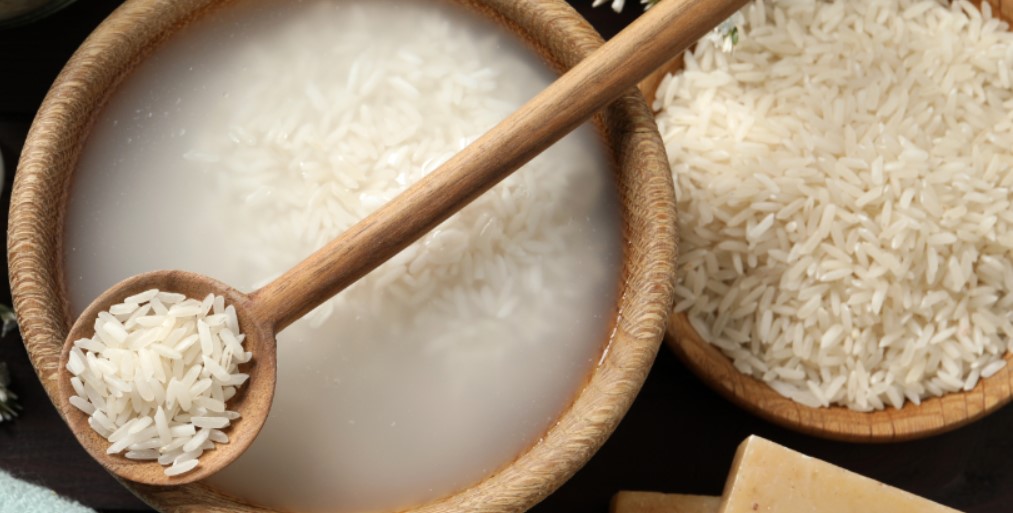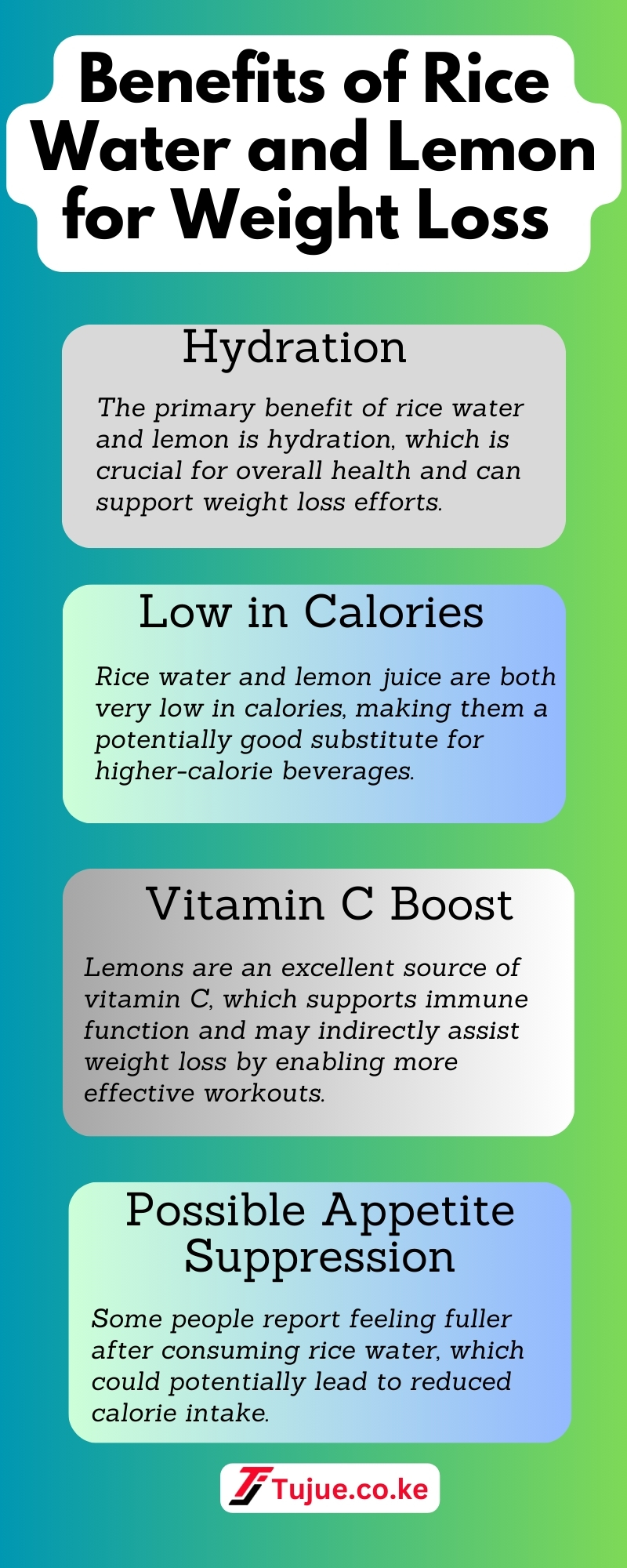Quick answer: It depends on several factors such as; metabolism, hydration, and appetite.
But let me tell you more about it!
Ever scrolled through social media and stumbled upon yet another miracle weight loss trick? Avocado toast has been the talk of town for a while now, but there’s a new duo in town: rice water and lemon!
While some proponents claim rice water and lemon can boost metabolism just like other super fruits and promote fat burning, others are skeptical about its effectiveness.
Let’s explore what science has to say about using rice water and lemon for weight management and whether it’s worth it in the first place.
What is Rice Water for Weight Loss?

Rice water for weight loss is the latest buzz in the diet world. This cloudy, starchy liquid – the leftover water from cooking or soaking rice – is being hailed by some as a secret weapon in weight loss.
Packed with vitamins, minerals, and antioxidants, rice water is thought to boost metabolism, curb appetite, and even improve digestion.
But here’s the kicker: while it’s low in calories and may help you feel full, there’s no magic in this potion. Think of it more as a supporting actor in your weight loss story, potentially replacing higher-calorie drinks and keeping you hydrated.
Does Rice Water and Lemon Work for Weight Loss?
It depends on several factors such as; metabolism, hydration, and appetite.
In the world of weight loss trends, rice water and lemon have emerged as a popular duo claiming to help shed kilograms. But does this combination actually live up to the hype?
Let’s explore the facts behind this trendy weight loss remedy.
While some proponents claim that rice water and lemon can boost metabolism and promote fat burning, scientific evidence supporting these claims is limited. The primary benefits of this drink are likely related to hydration and its use as a low-calorie beverage alternative.
Understanding the Trend
The rice water and lemon weight loss trend typically involves drinking a mixture of water used to cook rice (rice water) combined with freshly squeezed lemon juice. Proponents claim this concoction can boost metabolism, reduce appetite, and promote fat burning.
The Components
Rice Water: Rice water is the starchy liquid left over after cooking or soaking rice. It contains:
– Carbohydrates
– Inositol (a type of sugar)
– Small amounts of B vitamins
– Trace minerals
Lemon: Lemons are rich in:
– Vitamin C
– Citric acid
– Flavonoids
– Pectin (a type of fiber)
What Are the Potential Benefits of Rice Water and Lemon for Weight Loss
While rice water may not be a weight loss miracle, it does offer some potential benefits:

Benefits of Rice Water and Lemon for Weight Loss Infographic
1. Hydration
The primary benefit of rice water and lemon is hydration, which is crucial for overall health and can support weight loss efforts.
2. Low in Calories
Rice water and lemon juice are both very low in calories, making them a potentially good substitute for higher-calorie beverages.
3. Vitamin C Boost
Lemons are an excellent source of vitamin C, which supports immune function and may indirectly assist weight loss by enabling more effective workouts.
4. Possible Appetite Suppression
Some people report feeling fuller after consuming rice water, which could potentially lead to reduced calorie intake.
What Does Science Say?
Despite the claims, there’s limited scientific research specifically on rice water and lemon for weight loss. Let’s break down what we know:
Rice Water
– A 2022 study in the Frontiers in Nutrition found that rice water might have a prebiotic effect, potentially benefiting gut health.
– However, there’s no direct evidence linking rice water consumption to weight loss.
Lemon
– A 2015 study in the Journal of Clinical Biochemistry and Nutrition found that lemon juice may help reduce body fat accumulation in rats fed a high-fat diet.
– Research in humans is limited, but some studies such as a 2024 study in the Current Developments in Nutrition Journal indicate that vitamin C status is inversely related to body mass.
Experts also contend that rice water does not miraculously lead to weight loss in users. According to Scott Keatley, a registered dietitian and co-owner of Keatley Medical Nutrition Therapy,
“While rice water may have some nutritional benefits, such as providing a source of energy from its starch content, there is no evidence to suggest it has any properties that would significantly impact weight loss, especially in the manner that anti-diabetic medications like Ozempic do.”
Debunking the Myths
Fat-Burning Properties: There’s no scientific evidence that rice water and lemon combination directly burns fat or significantly boosts metabolism.
Detoxification: While often touted as a “detox” drink, our bodies have built-in detoxification systems (liver and kidneys). No scientific evidence supports the need for additional detoxification from foods or drinks.
Studies specifically on rice water and lemon for weight loss are scarce. Some research suggests lemon juice may help reduce body fat accumulation, but these studies were conducted on animals, not humans. Keri Glassman, MS, RD, CDN, a renowned nutritionist, contended that,
“Supplementation with lemon polyphenols and pectins suppressed weight gain and body fat accumulation through increased fat metabolism, while also increasing HDL cholesterol (the “good” cholesterol), decreasing LDL cholesterol (the “bad” cholesterol) and decreasing inflammation.”
As for rice water, while it may have some prebiotic effects benefiting gut health, there’s no direct evidence linking it to weight loss.
Ultimately, any weight loss experienced from drinking rice water and lemon is more likely due to overall calorie reduction and increased hydration rather than any special fat-burning properties.
Side Effects of Drinking Rice Water for Weight Loss
While generally safe, there are some potential side effects to consider:
1. Nutrient deficiencies: If used as a meal replacement, it could lead to inadequate nutrient intake.
2. Blood sugar fluctuations: Rice water contains simple carbohydrates, which might cause blood sugar spikes in some individuals.
3. Dental health: If combined with lemon, the acidity could potentially erode tooth enamel over time.
4. Digestive issues: Some people might experience bloating or gas, especially if consuming large quantities.
5. Arsenic exposure: If made from rice high in arsenic, frequent consumption could potentially lead to arsenic accumulation.
How To Make Rice Water
While the concoction does not magically reduce weight, here is a simple process of making rice water and lemon:
1. Rinse 1/2 cup of rice to remove any dirt or impurities.
2. Place the rice in a bowl and add 2-3 cups of water.
3. Let it soak for 30 minutes.
4. Strain the rice, keeping the water.
5. If desired, add the juice of half a lemon to the rice water.
6. Store any leftover rice water in the refrigerator and consume within 24 hours.
The Bottom Line
While rice water has gained popularity as a potential weight loss aid, it’s important to approach this trend with realistic expectations. Rice water may offer some benefits such as hydration, low-calorie refreshment, and possible appetite suppression, but it’s not a magic solution for shedding pounds.
The key to sustainable weight loss remains a balanced diet, regular exercise, and healthy lifestyle choices. Rice water can be a part of a well-rounded approach to weight management, but it shouldn’t replace nutritious meals or be relied upon as a primary weight loss strategy.
As with any dietary change, it’s wise to consult with a healthcare professional before incorporating rice water into your weight loss plan.

